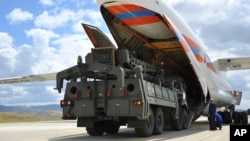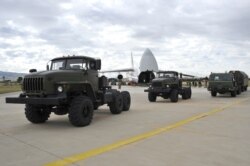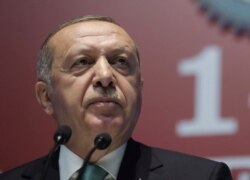Updated: July 13, 2019, 9:20 p.m.
VOA Turkish Service's Mehmet Toroglu contributed to this report.
Russia is continuing to deliver its S-400 missile system to Turkey for a second straight day, a move that could hurt Turkish-U.S. relations and puts advanced Russian military technology in possession of a key NATO alliance member.
Turkey's defense ministry said a fourth Russian cargo plane delivered more S-400 components to Murted Air Base near the capital of Ankara Saturday, ignoring threats of U.S. sanctions against Middle Eastern country.
A Russian transport jet Friday delivered the first parts of the $2.2 billion missile system, causing concern from Brussels to Washington.
Washington says the S-400, with its advanced radar that could potentially be used to target NATO jets, threatens to compromise NATO military systems in Turkey. The U.S. has stopped delivery of its latest F-35 jet if the Russia missiles are deployed, and Turkish firms may lose contracts to build significant parts of the expensive and complex F-35.
"We are aware of Turkey taking delivery of the S-400. Our position regarding the F-35 has not changed,” Acting U.S. Secretary of Defense Mark Esper told reporters Friday. He held a 30-minute phone conversation with his Turkish counterpart, Hulusi Akar, but the Pentagon did not provide any details from the call.
"Not an option"
Turkey’s Ministry of National Defense, however, did release details in a statement Friday. It said Akar told Esper that Turkey’s purchase of S-400 defense systems was "not an option but rather a necessity," and a proposal for a joint working group to assess possible interactions between the F-35 and the S-400 was “still on the table.”
Akar added that Turkey was still assessing the bid to acquire U.S. Patriot air defense systems, and that Turkey's partnership within the F-35 fighter aircraft program should continue “uninterrupted,” according to the statement.
U.S. State Department spokesperson Morgan Ortagus warned earlier this week of "real and negative consequences" if the Russian missiles are procured.
Potentially more damaging for Turkey are U.S. sanctions under the Countering America's Adversaries through Sanctions Act (CAATSA), which could hit Turkey's already weakened economy.
The top Republican and Democratic senators of the Senate Armed Services Committee and Senate Foreign Relations Committee, Sens. Jim Inhofe (R-Okla.), Jack Reed (D-R.I.), Jim Risch (R-Idaho) and Bob Menendez (D-N.J.), issued a joint statement Friday condemning the delivery and urging President Trump to fully implement the sanctions.
"By accepting delivery of the S-400 from Russia, President Erdogan has chosen a perilous partnership with Putin at the expense of Turkey’s security, economic prosperity and the integrity of the NATO alliance," the senators said.
"It did not have to come to this," they added, stating that Turkey had "rejected multiple attempts" by the United States to preserve the relationship while protecting Turkish airspace with F-35 fighter jets and the U.S.-made Patriot surface-to-air defense system.
US-Turkey relationship
Ankara is relying on Turkish President Recep Tayyip Erdogan's relationship with U.S. President Donald Trump. Last month, the two presidents met in Japan on the sidelines of the G-20 summit of the world's largest economies. At the time, Trump acknowledged the U.S. had a "complicated" situation when it came to responding to Turkey and noted that possible sanctions were being discussed.
International relations expert Soli Ozel of Istanbul's Kadir Has University said Ankara is miscalculating.
"If Congress says CAATSA takes effect, can Trump really say 'I will not be implementing it?' He can, but can he get away with it? I don't think so. But that is what Ankara believes and is the thread they are hanging onto. I don't know where analysis ends and wishful thinking begins with this administration," said Ozel.
Even though delivery of the S-400 has begun, there could be potential wiggle room to avert a full-blown crisis. Earlier this month, U.S. Senator Lindsey Graham appeared to raise the bar for sanctions, saying they may be triggered only when the missile system is activated.
Ankara has given mixed messages over the timing of the activation of the missile system. Ambiguously, Erdogan said this past week the system would only be used in the event of a threat.
The mounting diplomatic pressure is seeing Ankara push back, saying it will not bow to international pressure and as a sovereign nation, it has the right to buy whatever it wants from any country.
Turkish officials argue Turkey is in a tough neighborhood, with it bordering Iran, Iraq, and Syria. Three years ago, the Turkish presidential palace was bombed by rogue elements of its military in an attempted coup, and some analysts suggest the missiles could be used to protect Erdogan.
While the S-400 is widely recognized as one of the most advanced missile systems in the world, its practical use is in question, given its incompatible with the rest of Turkey's NATO military systems.
"From a military perspective there is no logic," said retired general Haldun Solmazturk, who now heads the Ankara-based 21st Century Institute research institution. "This is not only a problem between Turkey and the United States, but it is a problem between Turkey and the rest of the 28 NATO members, so it's a serious problem."
Blaming Obama, Congress
Erdogan is blaming former U.S. President Barack Obama and Congress for the crisis, with the blocking of the purchase of U.S. Patriot Missiles during the Obama administration.
"Turkey feels more and more alone in the Western world - none of the countries offer direct support for Turkey," said international relations professor Huseyin Bagci of Ankara's Middle East Technical University.
"The Russians are the winner of the day," he added. "The Russians are very successfully creating a conflict between Turkey, NATO and the United States and the Americans have made a lot of mistakes. They are the architects of this."
Ankara's purchase of S-400s, in the face of strong opposition from its Western allies, is part of a broader process of improving Russian-Turkish ties.
Erdogan has developed a good relationship with his Russian counterpart, Vladimir Putin, and Russia and Turkey are increasingly cooperating both economically and within the region in particular in Syria.
Some analysts see Ankara's escalating crisis with Washington over Russian missiles as part of a more fundamental problem, saying that since the end of the Cold War, the NATO allies' strategic interests are increasingly diverging.
"This is not a new relationship with the United States. It started in 1947 and NATO membership is 67 years old, and everything about Turkish defense and security is calibrated in the Western alliance, so to say we are leaving this is a fairly revolutionary step, and revolutions bring a lot of destruction," Ozel said.






